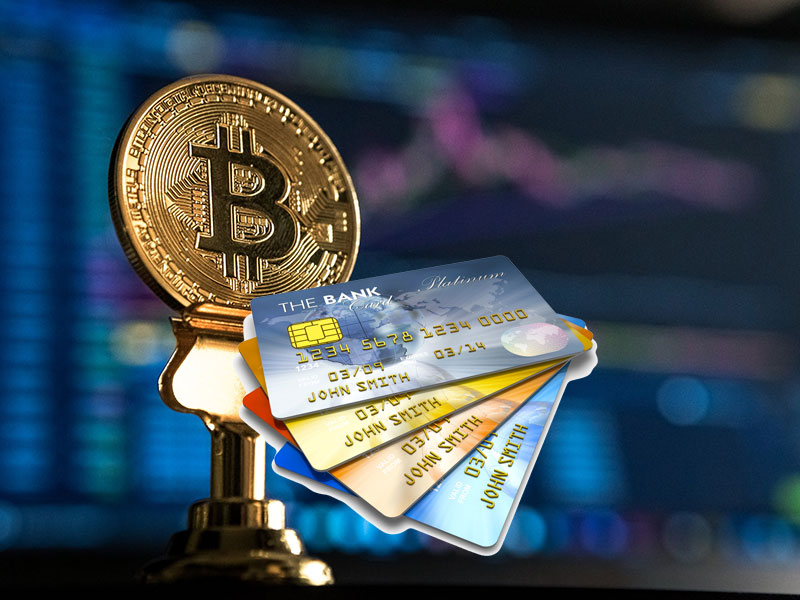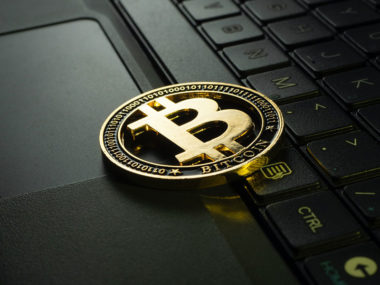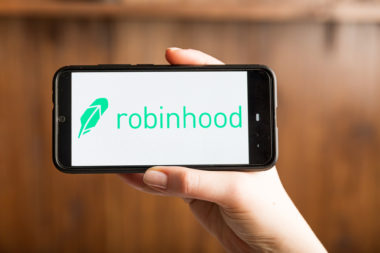Bitcoin is a well-known form of cryptocurrency that is becoming increasingly popular as an investment option. If you are interested in purchasing Bitcoin to diversify your investment portfolio but do not have a lot of money in your checking account, you can opt to buy Bitcoin with your credit card. Before you decide to take the crypto plunge, here are 12 things you need to know.

Table of Contents
1. Bitcoin Is a Cryptocurrency
Cryptocurrency is a type of virtual or digital currency that uses cryptography to verify and confirm transactions. These transactions are virtually recorded on a ledger known as the blockchain. The popularity and allure of cryptocurrency are due to the lack of an intermediary needed to perform transactions and the security that blockchain technology offers.
Digital currency may act as traditional currency in certain environments; however, it does not have legal tender status in the United States. Currently, Bitcoin is the most consistently valuable “convertible” cryptocurrency available for purchase. The convertible digital currency has equivalent monetary value or can be used as a substitute currency.
Users can trade Bitcoin in the digital arena, and they can also purchase or exchange it for U.S. dollars, Euros, other monetary currencies, or other convertible virtual currencies.
Although Bitcoin is not considered a legal U.S. tender, virtual currency transactions are taxable by law. You may have to report these transactions on your tax return. If you plan to sell Bitcoin, use it as a form of payment, or hold Bitcoin as an investment, be aware that this may result in a tax liability.
2. Bitcoin Must Be Mined Before Entering Circulation
All types of cryptocurrency enter circulation via a complicated electronic process called “mining.” This process requires an intricate computer network to solve complex algorithms needed to add new blocks to the blockchain. Miners are awarded a Bitcoin for every block they can add to the blockchain.
Because mining involves a lot of time and investment in equipment, users usually opt to purchase or exchange Bitcoin instead.
One interesting feature of Bitcoin is that the supply increases at a set rate and has a ceiling of 21 million. Because of this supply cap, this currency is often compared to the supply of a finite or scarce commodity, such as gold or silver. Unlike the United States Mint, the Bitcoin supply cannot be readily increased on a whim.
3. The Price of Bitcoin Is Subject to Volatile Changes
While Bitcoin is one of numerous cryptocurrencies in existence, it is the main digital currency used to calculate the actual value in the market. Like the stock market, prices for digital currency reflect consumer sentiment and how much buyers are willing to purchase it. In recent years, there has been a high degree of price volatility among all the cryptocurrencies.
For example, the price of Bitcoin increased from $30,000 in the middle of 2021 to almost $70,000 toward the end of 2021 before decreasing to around $35,000 in early 2022. Keep in mind that the value of Bitcoin was under one U.S. dollar in 2009.
These drastic price changes not only make Bitcoin a difficult currency to successfully invest in but also a tricky currency to use as a valid tender in everyday transactions. Online exchanges or sellers may also take advantage of these price changes to overcharge you when you buy Bitcoin with your credit card.
4. There Are Several Ways To Purchase Digital Currency
Crypto owners typically purchase Bitcoin through a mobile app, an online exchange, a website, or a cryptocurrency ATM. The most popular way to obtain Bitcoin is through online centralized exchanges. The three major exchanges are Coinbase, Robinhood, and Binance.
These popular exchanges do not accept credit cards; however, Coinmama, eToro, CEX.io, and Paxful accept credit cards for payment.
Once you find an exchange that accepts credit cards for payment, you may have to do further digging. Exchanges only accept certain cards, like Discover and Mastercard. You might be charged an additional fee for using credit to purchase your digital currency.
Moreover, your credit card company may not issue reward points for cryptocurrency purchases. There are only a few credit card companies that issue reward points for crypto purchases.
There are also decentralized exchanges that facilitate peer-to-peer transactions, eliminating the need to relinquish your cryptocurrency to a third party. These types of exchanges are becoming more popular since consumers can enjoy lower fees. The main caveat is to be careful of who you choose to purchase Bitcoin from.
5. You Should Know These Important Details Before You Buy
Before you purchase Bitcoin, it is important to consider the following factors:
- Exchange Rate: Because Bitcoin undergoes volatile price changes, it can be difficult to truly know what the current exchange rate is. Wherever you decide to purchase Bitcoin, find out if there are mark-ups to the exchange rate and if there are other fees associated with each purchase, especially if you plan to buy Bitcoin with your credit card.
- Bitcoin ATMs: These kiosks do not function like traditional ATMs. They are not linked to your bank account but can only be used to purchase Bitcoin via cash. Be wary of scams and high transaction fees when you use these “ATMs.”
- Public Ledger Implications: Certain information about every Bitcoin transaction is publicly shared in the blockchain ledger. Persistent cybercriminals may be able to link your transactions to other public keys and your computer’s IP address, making it possible for them to figure out much Bitcoin you own and where you are located.
- FinCEN Registration: Before using a digital currency exchange, verify that it is registered with the Financial Crimes Enforcement Network. Note that being registered with FinCEN does not guarantee that scamming will not occur.
6. Digital Wallets Are Not Impenetrable
Bitcoin cannot be held in a traditional bank account. Instead, you are required to have a digital wallet to store your cryptocurrency. A digital wallet is a software application that allows you to store and/or transfer the digital currency that you purchase. Your digital wallet is associated with your currency address, which assigns where you can receive cryptocurrency, and your private key, which is needed to transfer cryptocurrency.
Note that if you lose your private key, there is no customer service agent ready to help you out. Your funds would be lost forever.
Digital wallet providers offer the software needed to create and manage your wallet, which you can download online. Hosted wallet providers offer to create and manage your wallet on your behalf. Before deciding to self-manage a wallet or choose a hosted wallet, always read the fine print and find out what protections they offer in the event of hacking.
Although the Bitcoin platform is difficult to corrupt, your wallet can be vulnerable to cyberattacks. If your digital wallet is compromised, hackers may launch unauthorized transactions. Online criminals may even gain access to your debit and credit card information if your bank account is linked to your wallet.
In traditional banking, your funds are insured by either the Federal Deposit Insurance Corporation or the National Credit Union Share Insurance Fund. For digital wallet losses, the government will not reimburse your losses, since these wallets are not federally insured.
7. There Are Certain Benefits to Using Bitcoin as an Alternative Currency
Though cryptocurrency is a relatively new concept in the financial world, there are potential benefits. Bitcoin supporters assert the following:
- Increased Economic Efficiency: If Bitcoin and other cryptocurrencies become common forms of payment, the intermediaries involved in monetary transactions can be reduced. This allows transactions to become more streamlined, especially between international parties. Further, the costs and fees involved with banking intermediaries can be reduced.
- Decreased Inflation Rate: Cryptographic security protocols inherently limit the production of new Bitcoin. In countries where the population mistrusts government institutions, cryptocurrency is an attractive alternative to protect against drastic inflation changes.
8. Universal Bitcoin Adoption Faces Several Challenges
There are several noteworthy challenges to overcome before Bitcoin is universally adopted as a standard currency:
- The Function of Money: The ability of Bitcoin to serve as money depends on its ability to serve as a medium of exchange, a store of value, and a unit of account. Since Bitcoin is only accepted by a fraction of institutions as a currency and is currently not a legal U.S. tender, it is at present a poor medium of exchange. Further, its price volatility weakens its ability to be a stable store of value and account unit. Cryptocurrency owners usually purchase Bitcoin as an investment rather than as a daily tender.
- Scalability: Since digital currency transactions make up a small part of worldwide transactions that occur every day, it is difficult to predict how scalable a cryptocurrency platform is.
- Energy Consumption: A considerable amount of energy is required to run a computer network for Bitcoin mining. With the increasing concern for worldwide energy usage, this can be a drawback for many.
- Possible New Intermediaries: Platforms validate the transfer of cryptocurrency when exchanged; however, they do not validate whether a good or service has been successfully delivered to the buyer. To combat this, some platforms offer escrow services that allow an escrow company to hold your Bitcoin until you receive the good or service you purchased. While this is a neat solution, having to add in intermediary services undermines the original purpose for cryptocurrency use.
9. Current Policies May Not Address the Potential Risks of Bitcoin
Most financial laws and regulations were established before the existence of Bitcoin. Because of this, we cannot predict how the government will address the possible risks that Bitcoin can precipitate. These risks include:
- Criminal Activity: In addition to already being infamous for its use in the illegal online drug marketplace the Silk Road, Bitcoin is also susceptible to being used in unsavory money laundering practices. Further, people may find ways to evade their taxes using a cryptocurrency platform.
- Lack of Consumer Protection: In the U.S. there is no consumer protection law at the federal level that is geared specifically for cryptocurrencies. However, each state has laws against deceptive practices. Still, if you become a victim of theft or fraud, it will be difficult to re-gain your lost assets immediately.
10. You Should Be Aware of the Risks When You Buy Bitcoin With Your Credit Card
Before you decide to buy any type of cryptocurrency, it is important to understand the potential risks. One of the biggest ways to mitigate risk is to understand how to identify scammers. Do not purchase from a platform that promises you a large return on your investment. Do not use a platform that “demands” payment in cryptocurrency.
Moreover, confirm that a potential seller is transparent with their contact information and location. You can further verify the legitimacy of a seller by investigating if there have been negative reviews or complaints in the past.
11. Your Credit Score May Be Affected When You Buy Bitcoin With Your Credit Card
While purchasing Bitcoin with your credit card allows you to start investing in digital currency without cash, your credit score may get affected negatively if you cannot pay your credit card bill in time. If you do not foresee being able to pay off your credit card debt promptly, it is recommended to delay your decision to buy Bitcoin with your credit card.
On the other hand, if you plan on buying only a small amount of Bitcoin that you can afford, go ahead and use your credit card. This will eventually cause your credit score to improve if you send your payments in time.
12. Knowledge Is Power in the Cryptocurrency World
Fiscal Tiger aims to empower consumers to improve their credit through sound investment strategies. We strive to stay up to date with current market trends to help you understand the ever-evolving state of the economy. Whether you are a business owner or a novice investor hoping to improve your credit, we have the resources for you. If you want to know how to buy Bitcoin with your credit card, we can help. Access our website today and let us be your guide on your credit journey.





